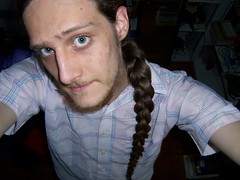Password
(Potentially relevant link)When you look up a word that 'may be inappropriate for children' ('cunt' and 'shit'. Not 'bitch'), Webster's Online Dictionary: Rosetta Edition requires that you enter a 'password':
Because no child can figure out the cube root of 27, right?The answer to any of these questions is a valid password for this page:
1. Cher's former partner's last name (4 letters)
2. The cube root of twenty seven (5 letters)
3. The "incident" before the Vietnam War (6 letters)
4. The theory that physiology and physics are drivers of economics (15 letters)
5. A good mustard (5 letters)
By the way, if you can't figure out any of the answers, don't worry. Doing so simply forwards you to the definition of the word followed by '1', so you can circumvent it by looking up 'cunt1', 'shit1', 'cock1'...

2 comments:
A good mustard? WTFH?
1. "Sonny" is more than four characters. I had to check Wikipedia to realise that the answer probably should be "Bono", which of course was also Cher's name one they married. Checking Wikipedia should be easy enough a step for any child that can use Webster's Online Dictionary. Of course, Wikipedia has all of these words without any sort of age verification or even rating system (I would endorse that much).
2. Here, we are pitting children who are probably learning this stuff right now against adults who might not have had to think about cubes in years. Clever. (TBH, I don't know at what age children are usually taught this stuff in English-speaking countries.)
3. I'd have to look this up to know to which "incident" it refers. Again, if I can find it on Wikipedia, any child can.
4. Hm, I'm not the only one with no idea: <http://leiterreports.typepad.com/blog/2004/10/is_economics_a_.html#comment-3320513>. Not so easy to find on Wikipedia. I gave up pretty quickly.
5. "Plain" would have been while I was young and would be still my answer. "Jalapeño" is too long and I don't like especially "Dijon", but any of these will probably be known by most children. At least "plain" isn't to be found in Wikipedia's article, altho "Dijon" is.
The takeaway from this exercise: Children should be kept stupid and should not be allowed to use Wikipedia. I've been so wrong in my thinking.
Post a Comment